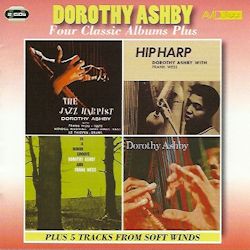CD1
The Jazz Harpist
1. Thou Swell
2. Stella By Starlight
3. Dancing On The Ceiling
4. Aeolian Groove
5. Quietude
6. Spicy
7. Lamentation
Dorothy Ashby – Harp
Frank Wess - Flute
Eddie Jones – Bass (tracks 1, 2, 4, 5)
Wendell Marshall – Bass (tracks 3, 6, 7)
Ed Thigpen – Drums
Hip Harp
8. Pawky
9. Moonlight In Vermont
10. Back Talk
11. Dancing In The Dark
12. Charmaine
13. Jollity
14. There’s A Small Hotel
Dorothy Ashby – Harp
Frank Wess – Flute
Herman Wright – Bass
Arthur Taylor – Drums
In a Minor Groove
15. Rascallity
16. You’d Be So Nice To Come Home To
17. It’s A Minor Thing
CD2
In a Minor Groove
1. Yesterdays
2. Bohemia After Dark
3. Taboo
4. Autumn In Rome
5. Alone Together
Dorothy Ashby – Harp
Frank Wess – Flute
Herman Wright – Bass
Roy Haynes – Drums
Dorothy Ashby
6. Lonely Melody
7. Secret Love
8. Gloomy Sunday
9. Satin Doll
10. John R
11. Li’l Darlin’
12. Booze
13. Django
14. You Stepped Out Of A Dream
15. Stranger In Paradise
Dorothy Ashby – Harp
Herman Wright – Bass
John Tooley – Drums
Soft Winds
16. The Man I Love
17. My Ship
18. Love Is Here To Stay
19. I’ve Never Been In Love Before
20. Laura
Dorothy Ashby – Harp
Terry Pollard – Piano, vibes
Herman Wright – Bass
Jimmy Cobb - Drums
For a long time I thought I was one of a very limited number of people who had heard of Dorothy Ashby – let alone appreciated her work. So I am gratified
to find that the Avid label has regarded her as sufficiently important to merit inclusion in their series of excellent budget reissues.
Dorothy Ashby is one of those rarities: a jazz harpist. Adele Girard and Casper Reardon are well know from their jazz harp recordings in the 1930s, and
more recent exponents of this rare art include David Snell, Corky Hale and Alice Coltrane. Harpo Marx deserves a mention, even though his harp-playing
seemed limited. And that’s about it: unsurprisingly, as the harp is a difficult instrument to play in a jazz context. It is not very capable of fast
passages, and its tendency for the notes to continue ringing after they are played makes it unsuitable for types of jazz which require precision.
Nevertheless, Dorothy Ashby proves in this collection that she can play fastish numbers, like the mid-tempo Dancing On The Ceiling and the quicker Aeolian Groove. She is also a fine exponent of ballads, using plenty of arpeggios (which seem to be what classical harpists play most of the time)
but also creating lovely melodies – like her own composition Quietude. In fact Dorothy wrote many of the tunes on this album, revealing a talented
creator of varied material.
This compilation contains four original LPs dating from 1956 to 1961, plus five tracks from the 1961 album Soft Winds. On the first three LPs,
Dorothy is joined by flautist Frank Wess. The flute blends well with the harp, and Frank gets almost as much solo space as Dorothy. He often creates neat
counterpoint with Dorothy’s harp. The sound quality of these first three LPs is not particularly good, even though all the tracks have apparently been
remastered. The sound on some tracks is boxy or muffled. Ed Thigpen’s drums are virtually inaudible on The Jazz Harpist, except when he plays drum
breaks. Art Taylor’s drums are more prominent on Hip Harp.
But Dorothy Ashby’s harp comes through fairly clearly. Ashby really shows the harp’s potential in Moonlight In Vermont, where the rustling strings
conjure up thoughts of mountain streams or the fluttering of nighttime breezes. Dorothy also has an amusing tendency to quote other pieces of music, as
when she quotes from Peter and the Wolf in Charmaine. And you can sometimes hear her humming alnong with her solos, like Keith Jarrett or
Glenn Gould!
The last two LPs give Ashby more of the limelight, as she is joined simply by a rhythm section (on the Dorothy Ashby LP, this is just bass and
drums). This enables us to savour her expertise closer-up, and hear how she can swing a number like Secret Love while interpolating some cheeky
quotes from other tunes. Gloomy Sunday appropriately has the sound of bells and the mood of a funeral march. Dorothy takes L’il Darlin’
at a faster tempo than the Count Basie original but it works well at her tempo. The five tracks from the Soft Winds album have the variety of
pianist Terry Pollard also playing the vibes, a sound which contrasts with the harp. Dorothy and Terry both play My Ship with feeling.
It is good to see recordings by Dorothy Ashby being freely available again. Buy now while stocks last.
Tony Augarde
www.augardebooks.co.uk
